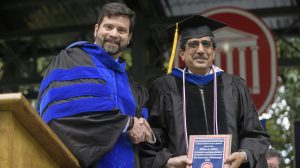
University of Mississippi Interim Vice Chancellor of Research and Sponsored Programs Josh Gladden presents Ikhlas A. Khan with the Distinguished Research and Creative Achievement Award during Commencement 2016. Photo by Thomas Graning/Ole Miss Communications
OXFORD, Miss. – External recognition is always appreciated, but being honored internally by peers is far better. So says Ikhlas A. Khan, who received the University of Mississippi’s 2016 Distinguished Research and Creative Achievement Award on Saturday (May 14).
The UM research professor of pharmacognosy and associate director of the National Center for Natural Products Research was presented the prestigious honor, which includes $7,500 and a personal plaque, during the university’s annual Commencement ceremonies in the Grove.
“I was humbled and honored to be considered for this prestigious award,” Khan said upon learning of his latest accolade. “I have received many awards before, but getting recognition at home always has special meaning and is a feeling which is hard to describe.”
Josh Gladden, UM interim vice chancellor for research and sponsored programs, said Khan is most deserving of the award.
“The University of Mississippi is fortunate to have had a very qualified pool of outstanding candidates for this year’s award,” Gladden said. “Each candidate is evaluated by a panel of distinguished researchers from across the UM research community, and Dr. Khan quickly rose to the top.
“Dr. Khan’s prolific and impactful work has been well recognized on a national and international level, and we are pleased to recognize his accomplishments on his home campus.”
Khan also recently received the IAMSTAM Zandu International Award for Excellence in the Field of Ayurvedic and/or Natural Products and the Outstanding Contribution in Natural Products Research/Water’s Corp.
He holds a doctorate in pharmacy from the Institute of Pharmaceutical Biology in Munich, Germany, and joined UM as a research scientist in the Research Institute of Pharmaceutical Sciences in 1992. Because of his valuable contributions and potential for leadership, he was appointed as a research assistant professor in the university’s Research Institute of Pharmaceutical Sciences and Department of Pharmacognosy three years later.
In 2001, Khan was promoted to associate professor and in 2002 became NCNPR assistant director. Within three years, he was again promoted to professor, and promoted to his current position in 2015. Khan also serves as director of the U.S. Food and Drug Administration Center for Excellence, Sino-US TCM Research Center and Center for Research of Indian Systems of Medicine at UM.
During his tenure at the university, Khan’s scientific achievements have gained him international recognition as a scholar, leader and innovator. He is renowned for his collaborative work with the U.S. FDA to ensure quality and safety of botanical dietary supplements worldwide.
His other honors include the Center for Food Safety and Applied Nutrition Director’s Special Citation Award, Varro E. Tyle Prize from the American Society of Pharmacognosy and ABC’s Norman R. Farnsworth Excellence in Botanical Research Award.
Khan has authored or co-authored more than 600 refereed journal articles, served on dissertation committees for 29 graduate students and trained more than 100 post-doctoral associates and visiting scholars. He serves/served as an editorial or advisory board member for more than 15 international research journals and has presented over 100 invited lectures globally.
As a principal or co-principal investigator, he has generated more than $30 million in external funding for NCNPR research in the last 15 years. Khan serves as PI in UM’s cooperative agreement with FDA and as a co-PI in the NIDA Marijuana Project.
His professional memberships include the International Society of Ethnopharmacology, New York Academy of Science, American Association for the Advancement of Science, American Chemical Society, American Association of Pharmaceutical Scientists, American Society of Pharmacognosy, International Society for Horticultural Science, American Society for Clinical Pharmacology and Therapeutics and many more.
“It is very gratifying to us in NCNPR to see Dr. Khan’s career research contributions recognized in this way by the University community,” said Larry A. Walker, NCNPR director and research professor. “The laboratory pursuits in his group have greatly contributed to scientific reference standards and methods for botanical identity, purity and safety.
“Just as importantly, his interface with industry, regulatory groups, scientific and trade associations, government health agencies, and research collaborators worldwide have framed a robust dialog and raised awareness for higher quality and greater accountability in the marketing and regulation of herbal and medicinal products.”
Khan already has plans for how he will spend funds that come with his award.
“I’m going to celebrate with the people who contributed through their hard work to achieve this award,” he said.
Khan and his wife, Shabana, a principal scientist at NCNPR, have a son, Farjad, a third-year pharmacy student at Ole Miss, and a daughter, Sariya, who is graduating from Oxford High School and has been accepted into the university’s Sally McDonnell Barksdale Honors College.
Created in 2008, the annual honor recognizes a faculty member who has shown outstanding accomplishment in research, scholarship and/or creative activity. It is sponsored by Pharmaceutics International Inc., whose CEO, Syed Abidi, is a UM alumnus.
Much like Hall of Fame inductions, recipients can receive the honor only once. Nominees must be an associate or full professor (including research associate professors or research professors who are not tenure-track faculty) and must have been continuously employed full-time by the university for at least five years.